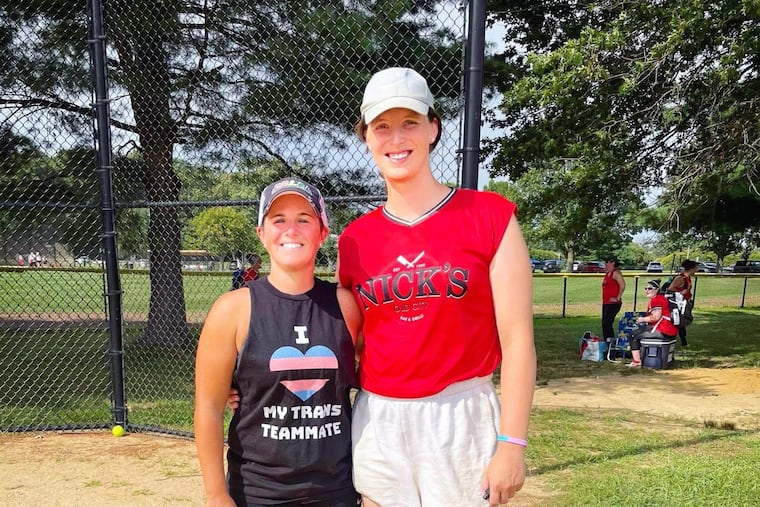I feel unsafe in broad daylight because of something I can’t change about myself | Opinion
My identity has been politicized on the field, as it has in Pennsylvania’s state legislature.

“You’re ruining sports for everyone.” These words reverberated in my ears as I made a great play at first base in a July co-ed softball tournament in Avalon, N.J., hosted by Heyday Athletic. My first thought was: Not again. Just two weeks prior, I was pulled off the field in the middle of an inning to show my ID, verifying my identity as a woman, while playing in a women’s slow-pitch tournament in Mercer County Park, hosted by the United States Specialty Sports Association (USSSA).
As a trans woman, I have become accustomed to the stares and glares, the mumbled comments, and the verbal and physical harassment wherever I go. But recreation softball, a space I rely on to escape from everyday life, should remain a welcoming and inclusive environment, free from transphobia and discrimination. In the July 12 incident, I was humiliated, embarrassed, and angry as my very existence as a woman was questioned by the opposing team and umpire. I was being protested — for being transgender and, frankly, a talented softball player, despite being fully eligible to participate based on USSSA policies. At the Heyday tournament July 23, my emotions quickly shifted from frustration to fear, as for the first time in a long time, I felt unsafe in broad daylight because of my gender identity. The opponent’s taunts from the dugout were so filled with hate toward my very presence, I actually worried things would escalate into violence after his team was removed from the tournament.
» READ MORE: ‘They just want the chance to play’: Reject transgender sports bans | Opinion
I left the South to escape the misinformed attitudes of a violent and vocal few, yet the hate and bigotry have followed me 500 miles up the Eastern Seaboard. These recent events proved that no distance can diminish the charged climate facing trans women like myself.
The propaganda campaign against trans women in sports was rearing its ugly head in adult slow-pitch softball for nothing more than a cheap plastic trophy and a T-shirt. I am tired of living in a world where my existence is seen as a political statement deserving derision and hate. I am tired of the activities, people, and places I love being taken from me, invaded, or diminished because of bigotry and misunderstandings.
My experiences are not isolated incidents. Attacks against trans girls and women are occurring at all levels of sport, across the country and world. Two transgender teenagers in Connecticut have been scrutinized over the last few years for having success in high school girls’ track and field. Civil rights groups filed suit on behalf of trans athlete Lindsay Hecox to challenge an Idaho law prohibiting trans athletes from participating in intercollegiate and interscholastic sports.
Critics are quick to call on “competitive advantage” as an argument to exclude transgender women from participating in women’s sports. However, advantage in sport extends far beyond physiological differences. Societal factors, like access to training facilities and coaching, influence advantage. Harping on physiological differences perpetuates the notion that women are inferior to men. Simply being assigned male at birth does not provide one with a natural ability to succeed in sports. Gender stereotypes reinforce the idea that “girls are not as good at sports,” and this premise underlies exclusionary policies that target trans girls and women.
Such legislation—currently being discussed in Pennsylvania—stokes the same fear that the opposing team, umpire, and unruly opponent had against me.
Across the country, state legislatures are couching their desire to force transgender girls and women back into the shadows of sexism with anti-trans sports bans, which passed in nine states. Such legislation — currently being discussed in Pennsylvania — stokes the same fear that the opposing team, umpire, and unruly opponent had against me, without any concrete evidence that trans athletes are dominating, ruining, or negatively affecting girls and women’s sports. On the contrary, transgender women are underrepresented at every level of sports — hence Laurel Hubbard this summer in Tokyo becoming the first openly trans woman to compete in an Olympics, despite a trans-inclusive policy for the Games since 2003. In fact, I am among the first trans women that many of my teammates in Philadelphia’s adult recreation sports community have interacted with.
While trans athletes have been the subject of heated contention in sports for two decades, only recently has a global spotlight shone on inclusion. Over the last few years, my opportunity to play has been politicized and my existence reduced to slander, fueled by misconceptions. To reach more equitable practices and fully inclusive policies, we need greater allyship from individuals willing to advocate for those whose life experiences differ from their own. We also need to address the inherent sexism at the root of women’s sports largely causing the uproar surrounding trans inclusion. Finally, we need a call to action to overturn and dismiss the discriminatory bills across our country that deny trans girls and women the tremendous benefits associated with playing organized sports.
Brittney Miller is a transgender woman from South Carolina, graduating with a bachelor’s in mathematics from the University of South Carolina and hoping to work in LGBTQ+ advocacy. Sara Steinman, director of wellness, athletics, and recreation at Delaware County Community College and a doctoral student in educational leadership and management, also contributed to this piece. They are teammates in the City of Brotherly Love Softball League in Philadelphia.